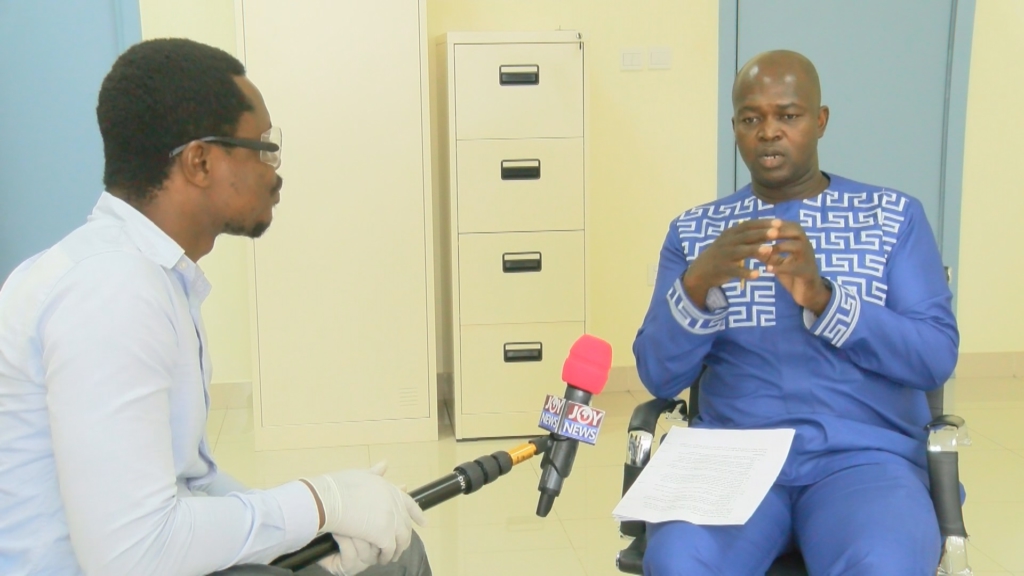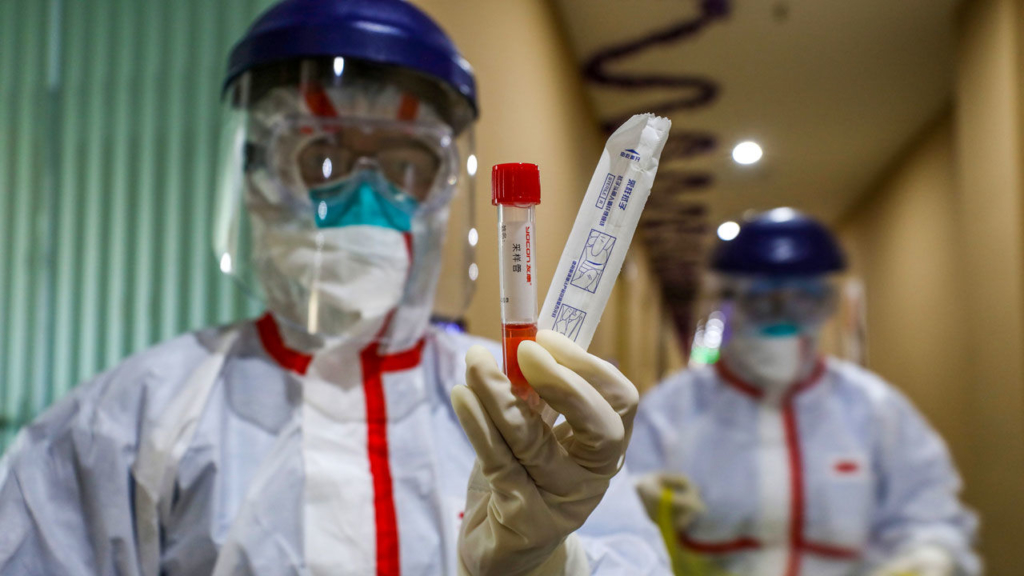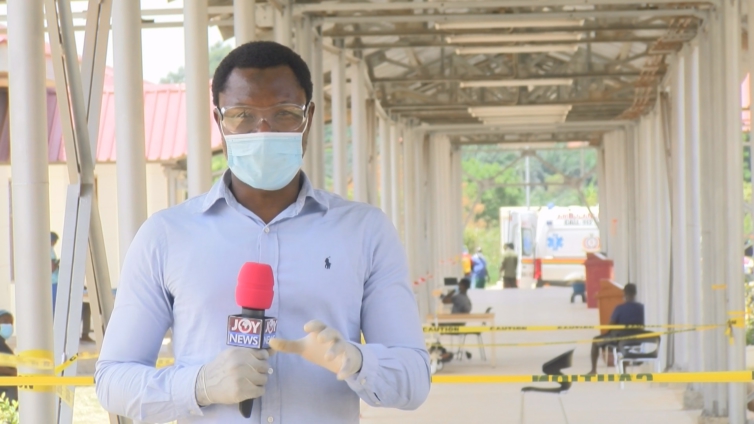The perception among the general population about Covid-19 patients is that they either have a broken or compromised immune system, and their mobility has been hampered.
Worse, many think Covid-19 patients are typically on life support. I must confess I have dabbled in some of these wrong perceptions, but that changed almost immediately when I stood inches away from the cordoned-off area that separates the frontline health workers (and the patients) from the general population.
I saw some of the Covid-19 patients pacing up and down the corridors of the Ga East District Hospital – Ghana's central holding and treatment facility for people battling with the virus.
While exhibiting my daring journalistic prowess by running checks and doing my own piece-to-camera (that is just when a reporter looks into the camera to speak directly to the viewing audience) and gathering video materials for broadcast, a nurse approached me and in what sounded like a whisper.
“I would want you to discuss and arrange with our leaders to let you speak with some of the patients. I am confident that will reduce the tension and stigma the virus has generated among members of the public,” she said.
That appeal by the nurse, whose name I didn't get, made a lot of sense. Because prior to my visit to the facility, my colleague Justice Baidoo had produced a captivating story about how families of Covid-19 patients are facing stigma in their immediate environment.
Family members of the patients who do business are sadly watching those businesses collapse because the people who used to purchase their products are moving away from them over fears of contracting the virus.
But that is a story for another day.

Back to my exclusive access to Ghana's Covid-19 treatment centre.
As a journalist, I've developed the skill of eavesdropping on conversations almost without effort, especially when I find the conversation relevant or in the interest of the larger population.
So I deployed that skill when I was given rare access to the facility, I overheard one of the trainers of the frontline health workers telling the trainees to essentially take all the precautions every time before they get close to patients, warning them not to take chances that could leave them exposed and threaten others.
This ‘stolen’ information got my adrenalin racing up as fear raced up my spirit. I felt insecure. But that fear only lasted a few minutes because just about fifteen minutes after hearing that caution statement to the frontline health officials, I moved into a secluded area where I interviewed the leader of the country's Covid-19 test team, Dr Samuel Kabah Akuriyea.
Dr Akuriyea’s confidence was infectious. The fear that raced through my spirits a few minutes before meeting him immediately vanished and my journalistic brain was active with a barrage of questions for him.
Like President Nana Akufo Addo, many Ghanaians have been sitting on tenterhooks as the nation awaits test results of thousands of samples that have been taken following the lockdown and the subsequent contact-tracing and testing, but Dr Akuriyea, with the aid of graphs and video animation, took time to explain to me how the lockdown and the ongoing case management has significantly blocked hundreds of infected patients from blending with and infecting the vulnerable larger population.
The country is also working together with other nations, big and small, to find a potent treatment to defeat the tiny monster virus that has killed five in Ghana, and thousands across the globe and left many battling for their lives in intensive care.
The lucky ones who have taken multiple tests and have been cleared to be negative are sitting at home, hoping they don't get to be carried to the hospital by loyal family members and close associates who have stood by them.
The World Health Organisation’s Solidarity project, a giant trial, testing the potential of therapies, old and new, to beat the coronavirus that is causing the current pandemic was ongoing at the holding centre. Medications like asytromison and hydroxychloroquine were being trialled on willing patients with the hope of figuring out the pill that will land the knockout punch to the virus.

If the Solidarity testing turns out to be successful and an antidote is found, that will, without a doubt throw the world into a joyous mood like in 1940 when the US developed a vaccine for the deadly influenza pandemic, Spanish flu that pillaged the world between 1918-1920, by infecting some 500 million people globally, and killed millions of people across the world.
Ghana’s approach to battling the virus, informed by a raft of measures announced by the President, puts the country in a lead to winning the fight. And that is why the stay-at-home directives to stop the spread of the virus are such crucial one that must be adhered to by the larger population.
Corporate organisations have also risen to the occasion and accepted the challenge of the President by donating PPEs to holding and treatment centres across the country.
I left the Ga East District Hospital with a lot of hope that we won't get to the levels of the USA and Europe. That hope was consolidated when results of some 700 test results came out and only 14 tested positive for the virus.
I smiled and thought to myself, Dr Akuriyea may be right after all: Ghana stands a good chance of getting out of the coronavirus woods unscathed. In fact, I am convinced that Ghana will not be battered like the USA, Italy, France, Spain, and Germany have been pounded – quite sadly – by the virus.
I am hopeful that the pandemic will leave a legacy of upholding the highest level of personal hygiene and safety in Ghana’s cultural fabric for generations to come.
To the frontline health workers I say, sannu-ku da aiki, Nii tuma, Ayekoo, mia wè dɔ wɔm, nye tsum kaa.
Latest Stories
-
Kurt Okraku took out ny passport from the U23 squad that travelled to Japan – Najeeb Yakubu alleges
2 mins -
Where hope fails: Ghana’s decaying home for the destitute
12 mins -
NDC Mining Committee for 2024 campaign refutes allegations of recruiting thugs for elections
22 mins -
Traction Control: A lifesaver with an off switch? Here’s why it exists
26 mins -
I don’t need anyman to woo me with money – Miss Malaika 2024 winner refutes pimping claims
33 mins -
”Kurt Okraku sabotaged my national team career because I refused to sign with Dreams FC” – Najeeb Yakubu
33 mins -
Businesses urged to leverage Generative AI for enhanced customer engagement
37 mins -
MultiChoice Ghana partners with Ghana Hotels Association to elevate guest entertainment
46 mins -
Bawumia’s music streaming app or Mahama’s pay-per-view TV channel?
51 mins -
Karpowership Ghana empowers 40 Takoradi Technical University students with scholarship
53 mins -
We expect significant reduction in prices of petroleum products in coming weeks – CEO AOMC
1 hour -
Betway Africa offers once-in-a-lifetime ‘Play-on-the-Pitch’ experience at Emirates Stadium
1 hour -
I coined the term ‘hype man’ in Ghana – Merqury Quaye
1 hour -
Vasseur questions ‘strange momentum’ of Formula One race director change
2 hours -
“I am disappointed in Kojo Manuel” – Merqury Quaye on “no tie” comment
2 hours

